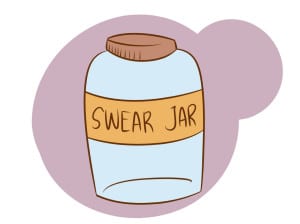
As a child, swearing is up the top of the list of things we’re taught not to do. You may have lost hard-earned pocket money to the swear jar atop the fridge. Despite parents attempts, as we mature profanities creep into our vernacular. On average 0.6% of daily speech is curse words and every language ever studied, dead or alive, contains profanities. Why do we use them?
Words carry an emotional connotation depending on how they are used within language. Swearing can add emotion and colour to a description, salience to a statement or be used as a means of acceptance – the willingness to break a cultural taboo in front of others creates an atmosphere of informality and a sense of community. Swearing can also act as a cathartic means to cope with pain.
We all have our own colourful choice of words we use after stubbing a toe on the kitchen door. This spicy language may actually be helping you. A team in the UK found that swearing increased tolerance of a painful stimulus and increased heart rate. It seems a logical theory to propose that humans evolved to automatically verbalise when in pain to attract help, ward off an aggressor, or declare defeat. If we consider our balance of danger and safety (DIM/SIM) then a verbal outcry to attract help, ward off an aggressor, or declare defeat would be safety-enhancing. So if pain is a measure of danger, then swearing may in fact lower our danger perception, and resultantly lower our pain. If you don’t believe the journals check out this Mythbusters clip – same result.
But why does the actual word we use matter? It seems pain is not just modulated by an outcry, but most effectively by a profane one. Being subjected to pain while calling out a neutral word (e.g. a descriptor for a table) did not have the same pain tolerance effect as a curse word. Perhaps it has something to do with the shock factor, the salience of a culturally inappropriate word. That this kind of word may attract more attention and increase the likelihood of being noticed and receiving help, or scaring the assailant.
What about the guy next door who swears all the time – does the power of profanity fade the more you use it? It seems so! A follow-up study found that for those who frequently curse in their daily life, then swearing when in pain is less effective to help cope. So if frequent swearing has a desensitising effect, perhaps our parents were right to discouraging its use – might be best to keep these golden words for the times we need them most!
If the aim of vocalising when experiencing pain is to attract help or ward off an aggressor, then would pain tolerance still improve if someone else made noise? Surprisingly not. A 2016 study found that pain tolerance only improved if the person experiencing pain was vocal, but not if they heard a recording of themselves or someone else being vocal. They concluded that there is something specific about making noise yourself while in pain that acts as a coping mechanism.
So perhaps try to keep it (relatively) classy, but don’t feel too guilty the next time a curse word slips your lips when you’re next in pain.
– Hayley Leake
Stephens, R, Atkins, J, Kingston, A 2009, ‘Swearing as a response to pain’, NeuroReport, vol. 20, no. 10, pp. 1056-1060.
Stephens, R, Umland, C 2011, ‘Swearing as a response to pain – Effect of daily swearing frequency, The Journal of Pain, vol. 12, no. 12, pp. 1274-1281.
Swee, G, Schirmer, A 2015, ‘On the importance of being vocal: Saying “ow” improves pain tolerance’, The Journal of Pain, vol. 16, no. 4, pp. 326-334.

Thanks Hayley,
Back in the day when we used to strongly mobilise frozen shoulders in the mistaken belief that we could somehow stretch the capsule out; I had my 68yo patient pinned to the bed while I levered her arm up. She grimaced, sweated, contorted a little and then finally yelled “killer diller, killer diller”. I paused and said “what’s with the killer diller stuff?” She caught her breath and said “ killer diller – all our family say it when things really hurt, my mother said it and so do my grandparents – it really helps when the going gets tough”. I continued mobilising and got quite a few more “killer dillers”. Funny thing – is – I told my wife and now we both say “killer diller” when something really hurts. Makes us smile and it sounds much better than the “faaaark” or similar that most people say.
David